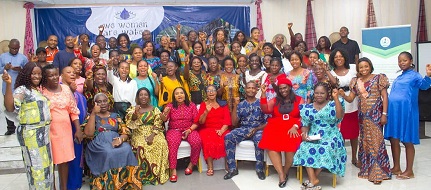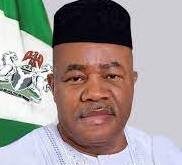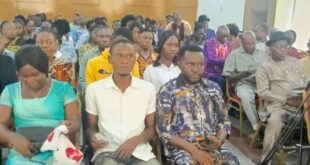By Paul Williams
Against the backdrop of the World Water Day, women from communities across the Niger Delta gathered in Port Harcourt on Thursday to lend their voices to the global call for the implementation of gender-just solutions to the global water insecurity and climate change crisis.
Gathering under the auspices of the ‘We Women Are Water’ campaign, the women from communities in Edo, Rivers, Akwa Ibom, Bayelsa and other states of the Niger Delta, stressed the relationship between women and water, while calling for gender-just solutions that would see them have access to clean drinking water.
Executive director of Kebetkache Women Development & Resource Centre, Emem Okon, whose organization facilitated the summit, with support from the Ford Foundation, said the cry for clean drinking water in the Niger Delta highlights the negative impact of extractive activities on clean water supply in the region, while pointing out the “significant role women play when it comes to water within the family and community at large.
“Women relate more to the issue of water, because of the gender roles in the family. Women fetch water, they carry out certain activities to preserve water. They are also the ones doing the washing, cooking and ensuring that the household have clean water to drink.
“It is important that we help women to perform these roles better by ensuring that there is access to clean water in the society,” she said.
Okon however noted that “in the Niger Delta, oil extraction has destroyed the environment, including water. So, we don’t have clean water to drink. In fact, we drink polluted water.”
She cited communities such as Ogoni, which a UNEP report showed has high levels of benzene (a poisonous substance) in its underground and surface waters – up to 900 times above the World Health Organization guidelines, and Ibaa community, also in Rivers State, with also high levels of pollution in its waters.
In an address earlier, the executive director of Kebetkache Women Development & Resource Centre, said that the ‘We Women Are Water’ campaign, which is led by the Global Alliance for Green and Gender Action (GAGGA), “calls on governments, international development banks and the Green Climate Fund to stop investing in environmentally destructive projects that violate human rights and negatively impact ecosystems, large hydropower dams, oil, and gas extraction activities, but to support and invest in community-led initiatives and local climate actions that address water issues and climate change.”
The objectives of the campaign, she said, include to ensure that “decision-making processes on water and climate related policies and projects are truly inclusive and co-created with women-led organizations and local groups who are actively engaged in gender-just water and climate solutions and directly impacted by water insecurity and climate change.”
Program manager, West Africa, Ford Foundation, Joy Ehinor-Esezobor, noted that in spite the fact that women are “important players in the protection and preservation of our sustained livelihood,” they sometimes have “little or no say in decisions about our lives as women, about our rights to food security and clean and healthy environment.
“The aim of this event is to raise awareness, to raise the voices of women who are advocating for and taking action against false climate solutions, privatization of resources, pollution of the extractives and human rights violations, as well as calling on governments to invest in gender-just water and climate solutions.”
Ehinor-Esezobor said Ford Foundation has been promoting issues of democracy and social justice in Nigeria, adding that as part of its Big Brother role in Africa, the nation’s efforts at implementing gender-just climate and water solution would send a positive signal to the rest of the continent.
The cry for access to clean drinking water was the major rallying point for the women. From Ibeno in Akwa Ibom State, Ogoni, Egbema in Rivers State, Edo State to Odi and others in Bayelsa State, the message was the same – the urgent need for access to clean drinking water.
This message the women captured in drama presentations, dance, poetry rendition and other forms of art.
In their separate goodwill message to the women, Ini Umoh (asst. director, Ministry of Environment, Akwa Ibom State), Wakedei Davidson Ere (deputy director, Ministry of Environment, Bayelsa State) and Nimi Elele (Ministry of Environment, Rivers State) agreed on the need to ensure the inclusion of women in decision-making on issues affecting their lives, especially with regards to the provision of clean drinking water.
Umoh captured their individual thoughts when she described women as life-givers, while noting that women and water “are both sources of life and basis of existence.”
She noted that “the lack of safe water, sanitation and hygiene services and facilities affect women differently and on a more negative note than the male gender.
“Access to clean water and sanitation is the right of everyone. But when the woman or girl-child is denied such right, their well-being, educational, economic and otherwise, feel the negative impact,” she said.
Wakedei Ere further urged the women to consciously seek to access the political space where decisions about their lives are being taken, while Nimi Elele used the opportunity to inform the gathering that the Rivers State government has embarked on an ongoing water project that will see residents of Port Harcourt City and Obio/Akpor have access to clean drinking water.
Parish priest at St. Anthony Catholic Church, Igwuruta, venue of the summit, Rev. Fr. Clement Lebari Dekoo, who could not hide his joy over the event, captured the importance of women and water to creation when he joined one of the women’s dance presentation.
He later told our correspondent that “women are the ones carrying a lot of load in the family. They carry the load of their husbands, the load of their children. They are the ones that have to go around searching for water for the children. So it is very important that the women have to champion this cause of searching for a solution.”
One of the participants from Edo State, Comrade Cynthia Buluebiere Bright, later told our correspondent that her community, which is an oil bearing community “is already suffering the issue of environmental degradation, and quite recently, river pollution, due to oil spills and gas flaring.
“Because of the oil spills and gas flares, we now hear of women in the community suffering water-related diseases like typhoid, cholera and others,” she said, adding that due to the lack of health centre in the community, they have to take such women to the city where there are hospitals, sometimes leading to the death of some before they could get medical help.
Among the events at the summit was the presentation of a lecture on ‘Access to Clean Water: Implications of Polluted Water for Women’s Health’ by Dr. Fortune Uchenna, consultant at F&E Global Resources.
 PH Mundial – Port Harcourt Online Newspaper News Across The Region
PH Mundial – Port Harcourt Online Newspaper News Across The Region





